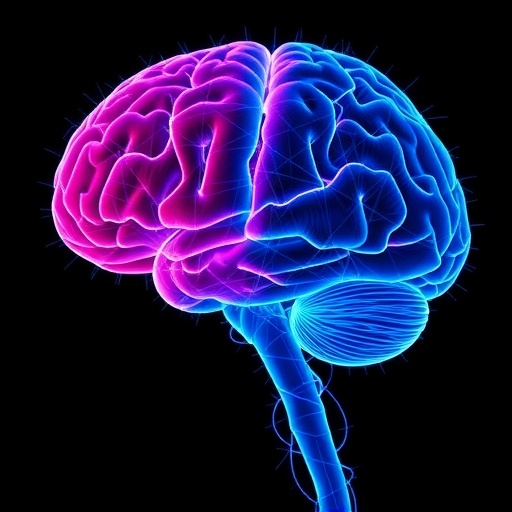Recent scientific investigations into neurodegeneration have unveiled compelling connections between hemispheric disconnection and its role in cognitive decline, particularly in conditions such as apraxia and Alzheimer’s disease. The groundbreaking study by M. Sanna, published in Discover Mental Health, explores this relationship in detail, highlighting how the brain’s interconnected systems may become disrupted, resulting in significant behavioral and cognitive manifestations.
Hemispheric disconnection refers to the disruption of communication between the two hemispheres of the brain. Typically, the two sides of the brain work in harmony, sharing information and collaborating on cognitive tasks. However, early changes in patients with neurodegenerative conditions may initiate a breakdown in this communication, leading to symptoms that are characteristic of apraxia, such as motor planning difficulties, and cognitive impairments associated with Alzheimer’s disease.
In evaluating the link between apraxia and Alzheimer’s, Sanna emphasizes how apraxia, characterized by difficulty in executing coordinated movements, may serve as a precursor to Alzheimer’s-related symptoms. Patients may exhibit disconnects in processing motor commands, severely impacting their daily life activities. Understanding the role of hemispheric disconnection in apraxia could thus provide insights into the earlier detection and intervention methods for Alzheimer’s disease.
The study sheds light on the brain’s plasticity, particularly how it responds to pathophysiological changes inherent in neurodegeneration. Sanna discusses the notion of hemispheric dominance, wherein one side of the brain may compensate for losses in the other. This compensation, however, may not be sufficient, as the gradual loss of connectivity exacerbates symptoms and accelerates cognitive decline. Exploring these compensatory mechanisms can open avenues for therapeutic strategies aimed at enhancing neural resilience.
Moreover, recent neuroimaging techniques have allowed researchers to observe these disconnects in real-time, facilitating a better understanding of the underlying neural changes. These techniques reveal decreased connectivity between specific brain regions in individuals with Alzheimer’s, which correlate with their clinical symptoms. Sanna highlights how such visualizations not only support the theoretical framework but are pivotal in validating the need for targeted interventions.
The intersection of apraxia and Alzheimer’s provides a unique perspective on their underlying pathophysiology. Sanna posits that the shared mechanisms of neurodegeneration involving synaptic degradation and neurotransmitter imbalances may compound the effects seen in individuals. Investigating these commonalities presents an opportunity for creating comprehensive treatment approaches that address both motor and cognitive functions simultaneously.
Furthermore, Sanna’s research underscores the importance of early intervention in mitigating the effects of hemispheric disconnection. By recognizing the signs of apraxia in older adults, clinicians might identify individuals at risk of progressing to Alzheimer’s disease much earlier. This proactive approach could change the trajectory of patient care, emphasizing prevention rather than reactive strategies only after symptoms have significantly progressed.
Among the theoretical implications of this research, Sanna highlights the potential for neurorehabilitation strategies that target hemispheric connectivity. Activities designed to reinforce interhemispheric communication may not only improve motor skills affected by apraxia but could also enhance cognitive performance. This reflective approach advocates for a comprehensive intervention plan aiming to stimulate both hemispheres to work collaboratively.
Additionally, the study contributes to the broader understanding of neurodegenerative diseases by framing apraxia as a symptom rather than an isolated disorder. By integrating apraxia into the conversation surrounding Alzheimer’s, Sanna challenges the clinical community to rethink traditional diagnostic boundaries. Considering the impact of motor coordination on cognitive functions shapes how we evaluate and treat these conditions.
As we delve deeper into neurodegenerative processes, Sanna calls for multidisciplinary collaborations to advance our understanding of the brain. Cognitive scientists, neurologists, and rehabilitation specialists must work together, sharing insights and developing integrated protocols to offer holistic care. This spirit of collaboration could amplify research findings and transform clinical practices, providing patients with more tailored and effective therapies.
The psychosocial implications of Sanna’s work cannot be overstated. Not only does it bring forth the medical challenges of neurodegenerative diseases, but it also highlights the emotional and social struggles faced by those affected and their families. By bringing attention to conditions like apraxia, the stigma surrounding these cognitive disorders can be reduced, fostering greater awareness and understanding.
In conclusion, Sanna’s study is a significant contribution to the ongoing conversation about neurodegeneration, offering a fresh perspective on the complex interplay between apraxia and Alzheimer’s disease. Understanding the role of hemispheric disconnection provides a critical framework for future research, possibly leading to breakthroughs in treatment modalities that could profoundly improve the quality of life for those suffering from these debilitating conditions. The continued exploration of these themes promises not only advancements in neuroscience but also a compassionate approach to patient care.
This research lays the foundation for future inquiries into the complexities of brain disorders, ultimately aiming to decode the intricate relations within the human brain. Addressing these challenges collectively could foster an environment in which breakthroughs are not merely aspirational, but rather achievable realities for patients everywhere.
Subject of Research: Neurodegeneration in apraxia and Alzheimer’s disease
Article Title: Hemispheric disconnection as a basis for neurodegeneration in apraxia and Alzheimer’s disease
Article References:
Sanna, M. Hemispheric disconnection as a basis for neurodegeneration in apraxia and Alzheimer’s disease.
Discov Ment Health 5, 178 (2025). https://doi.org/10.1007/s44192-025-00301-7
Image Credits: AI Generated
DOI: https://doi.org/10.1007/s44192-025-00301-7
Keywords: Hemispheric disconnection, neurodegeneration, apraxia, Alzheimer’s disease, cognitive decline.




